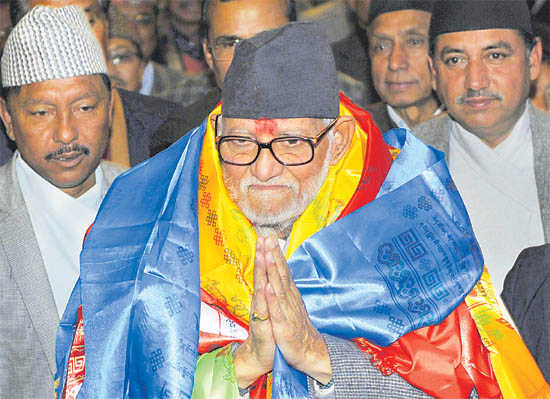
Sushil Koirala-1939-2016: The architect of Nepal’s new Constitution, he struggled for democracy in the nation. AFP
Jayant Prasad
With the demise of Sushil Koirala, Nepal has lost the last of its leaders from the first generation that struggled for democracy in the country for over half a century. “Sushilda”, as he was popularly known, became Prime Minister in February 2014, after a succession of Koirala brothers — Matrika Prasad, Bishweshwar Prasad, and Girija Prasad — had intermittently occupied that position from the 1950s until 2008. Sushilda was an extended cousin of these illustrious leaders, and gained high office the hard way.
Born in 1939, he started his life humbly. First acquainted with politics as the Secretary of the Nepali Congress leader, Tulsi Giri, he soon joined the entourage of the charismatic BP Koirala, who led the party to an impressive parliamentary victory in 1959. Confident of his popular mandate, BP came into conflict with King Mahendra, who dismissed his government the following year, suspended the Constitution, banned political parties, and jailed BP. After his release in 1968, BP decided to live in exile in Banaras, where Sushilda served him as a personal retainer. He remained a bachelor, and spent an entire lifetime in the service of the Koirala family, and of his nation.
Sushilda, as several of his predecessors as Prime Minister, had served time in an Indian prison. But unlike BP, Krishna Prasad Bhattarai, and Manmohan Adhikari, who were jailed by the British for their contribution to India's freedom struggle, Sushilda was imprisoned for his participation in the 1973 Forbesgunj plane hijack, masterminded by the Nepali Congress leadership. The aim was to loot Nepal Rashtra Bank's funds being carried from Biratnagar to Kathmandu for fuelling the pro-democracy movement in Nepal against the dictatorial monarchy. Sushilda was released only after the end of the Emergency in India in 1977.
Later, as a close and trusted political aide of Girija Prasad Koirala, who became Nepal's Prime Minister on four different occasions, Sushilda steadily rose in the party, becoming a Central Working Committee member in 1979, General Secretary in 1996, and Vice-President in 1998. His biggest test came following GP’s death in March 2010, when he continued as the acting President of the party — a responsibility not given to GP’s daughter, Sujata Koirala, then Foreign and Deputy Prime Minister. Six months later, Sushilda decisively won the party presidency.
Through his wise, dexterous, and statesman-like handling, GP steered Nepal towards a republican and democratic track, after a nine-year long insurgency. He then got the Maoists involved, together with representatives of the democratic parties, in drafting the 2007 interim Constitution, and organising the 2008 Constituent Assembly election. Although not directly involved in the critical democratic political transition, Sushilda helped GP through this period by managing Nepali Congress affairs. The Maoists triumphed in the 2008 election. Even so, Sushilda played a key role in fulfilling one part of GP’s inheritance by seeing through the integration of the former members of the People's Liberation Army into the Nepali Army. He believed this could be best done under a Maoist government. That is why, when some Nepali Congress leaders were being tempted by the extreme Left faction of the Maoists to bring down the government led by Baburam Bhattarai, Sushilda held them back. He remained supportive of the entire process of delicate negotiations on the numbers and ranks of the PLA cadres. His two subsequent decisions — not to allow the 2013 election under Bhattarai's caretaker government, and to refuse that responsibility himself due to the conditions being imposed on him — helped his party in the election.
Sushilda, however, stumbled as Prime Minister in his inability to honour the political commitments made by GP to the Janajatis and Madhesis following the 2006 and 2007 Jana Andolans, also reflected in Nepal's interim Constitution. Sushilda's governance skills were limited. He did not himself harbour any prejudices against the Madhesis and the social redistribution of power, but was steamrolled by those who abhorred a truly inclusive Constitution.
As the Constitution was being rushed through, with burgeoning protests against it in the Terai districts, Sushilda realised that a serious error had been committed. Unable to stop the promulgation of a flawed Constitution, he proposed an amendment bill before leaving office. His intriguing decision to contest against the incumbent Prime Minister, KP Sharma Oli, was partly to complete this unfinished task. The amendment finally got parliamentary approval three months later, after more protests, privation, and loss of lives. He was acutely aware that his party's electoral support lay in the Terai, and alienation of the Madhesi and Tharu population on the Constitution could become a liability for it.
Sushilda had many endearing qualities. Fascinated by celluloid, he wished to be a screen actor, not a political player. The simplicity with which he lived is a rarity among political leaders, as much in South Asia as the rest of the world. He had virtually no material belongings, much like Krishna Prasad Bhattarai. He was steadfast, even stubborn, in his core beliefs, democracy being one of them. He was a tenacious fighter, battling cancer and his adversaries. He treasured loyalty. He was a patriot and an intrepid political organiser, leading his party to a remarkable victory in the 2013 election. He could connect with party leaders across Nepal’s 75 districts. Although his legacy might be disputed, Nepal will miss him in its unfolding transition.
The writer, a former Indian Ambassador to Nepal, is currently the Director General of the Institute of Defence Studies & Analyses, New Delhi.



























